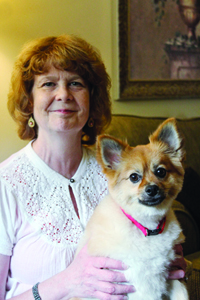Cervical Cancer Survivor
With a Little Help from her Friends Cervical Cancer Survivor Surrounded by Love and Support
 Debbie Montavy was only 35 years old when she was diagnosed with cervical cancer. The news was a shock to the Independence, Mo., resident who was busy with her family, church activities and working as a secretary. But the support she received from those friends and family, she said, helped push her through her cancer journey. She also volunteered with the R.A. Bloch Foundation Hot Line to encourage others dealing with their own cancer experience.
Debbie Montavy was only 35 years old when she was diagnosed with cervical cancer. The news was a shock to the Independence, Mo., resident who was busy with her family, church activities and working as a secretary. But the support she received from those friends and family, she said, helped push her through her cancer journey. She also volunteered with the R.A. Bloch Foundation Hot Line to encourage others dealing with their own cancer experience.
This all started with a minor leg injury. I had fallen in November 1989, and while visiting my doctor, the receptionist reminded me I was overdue for a Pap smear. After the test a month later, my doctor immediately referred me to an OB/GYN. I was concerned but knew I would just have to wait until my appointment. My results would be back by then, and the OB/GYN would give me more details.
That is when I was told – without a doubt – I had cervical cancer. I was only 35 years old at the time, with a teenage boy and a husband at home. My first reaction? This can’t be happening to me. But I quickly realized I needed to deal with this problem, so when I was referred to an oncologist, I planned to do exactly what he was suggesting.
After further X-rays and MRIs, I was diagnosed with Stage IIIB cervical cancer. Mine was an adenocarcinoma, which only constitutes about 10 to 20 percent of cervical cancers and develops from the mucus-producing gland cells of the endocervix.
I had a tumor the size of a quarter, and six lymph nodes were affected. Treatment began with a radical hysterectomy, followed by four months of chemotherapy and 38 radiation treatments. I was originally slated for fewer radiation treatments, but by doing more I was able to avoid an implant (internal radiation).
Like most survivors will tell you, treatment wasn’t easy. It took a toll, both physically and emotionally—my body was going through all kinds of changes. At one point, I came very close to needing a blood transfusion because my blood counts were so low, but they slowly climbed back to normal in time.
Thankfully, my husband and son were extremely supportive, and I know I couldn’t have made it through without them. Just their simple words of confidence, telling me I would be okay, kept me striving for that goal. I also worked in the social services and chaplain’s office at a hospital during this period, which was such a godsend for me. Both the social workers and chaplains were so helpful, and I’ll never forget their genuine love and encouragement.
Recovery seemed slow, but I’m happy to say there have been no recurrences since my treatments ended. I found that just talking about my experience – to friends, family, co-workers – was so beneficial for me. The more I talked about it, the better I learned to deal with it. I found support groups that were helpful, and I now have new appreciation for Louie Armstrong’s “What a Wonderful World.”
For me, the whole journey was a learning experience about myself. I learned I had more courage than I would have ever believed. I learned a new sense of patience. I learned that while it’s scary, you can beat this mean ol’ disease.
Now, I tell others facing cancer how important it is to get educated in your medical care. Maintain a good diet (fruits and vegetables are so important!), and listen to your doctor, but get a second opinion if you think it’s necessary. Lean on your friends and family. Look ahead to your future, and repeat to yourself, “I can make it, I will get through this, and I will be stronger than ever.”
And if you need a little extra encouragement, go buy the Helen Reddy record, and keep “I am Woman” on repeat. That seemed to work for me!



